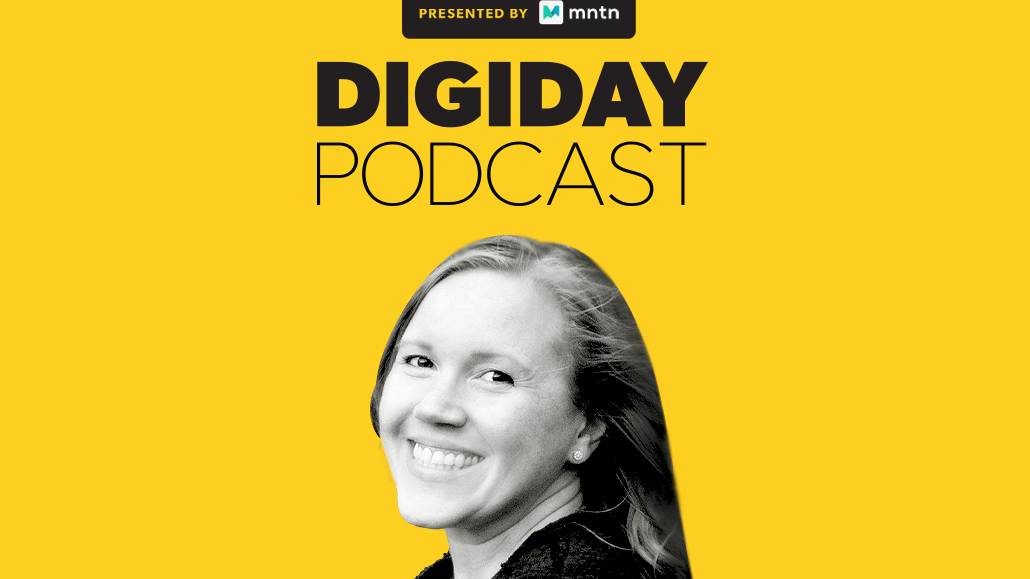Secure your place at the Digiday Media Buying Summit in Nashville, March 2-4
Magnet’s Danielle Johnsen Karr explains why Team Whistle’s social content agency is not a branded content studio

Subscribe: Apple Podcasts • Spotify
In February, digital video publisher Team Whistle unveiled Magnet. The Eleven-owned media company billed Magnet as a social content agency rather than the more typical branded content studio label that publishers have opted for in the past.
In the latest episode of the Digiday Podcast, Magnet lead Danielle Johnsen Karr explained that the company felt the studio label could constrain the roughly 35-person agency’s prospective client base.
Magnet provides a lot of the same services as the typical publisher branded content studio, such as short-form video production and editing down clients’ long-form content, Johnsen Karr acknowledged. But the social content agency also provides influencer marketing and channel management services and is looking to secure longer-term relationships with advertisers that extend beyond the scope of a given campaign.
“We felt like if we landed in that studio space, while we do all have those offerings, it might just sort of limit us in where we were going to reach some prospective clients, especially when we wanted to get into those longer-term remits with certain opportunities,” said Johnsen Karr.
If Magnet does not fashion itself a branded content studio and describes itself as a social content agency, does that put it in the realm of traditional creative agencies? That designation would fit Johnsen Karr’s background, having come from the agency world and worked for agencies including McCann NY, Deutsch NY and 360i.
“Good question. We’re probably not seeing ourselves as your typical creative agency. We do offer a lot of the services. What we don’t want to be doing is more of that day-to-day management,” Johnsen Karr said.
Social content agency it is.
How Magnet is organized
Right now officially only on the agency side, we have about 35 people. It’s a mixture of account folks, creative folks, strategy folks. And then we have some shared resources. Some of that measurement piece is a shared resource. Technically, they’re on the agency side, but they’re a shared organization resource.
Production as a shared resource
Our production team is more of a shared resource. We have graphic designers, post-production resources. We use them in a very similar fashion. A lot of our kickoffs have a holistic team where we bring in the directors, production, post-production and all of that is happening at the same time. If we’re creating a video series or video content that is deemed with a much higher level of production, we’ll bring in those folks.
The production opportunity
We’ve worked with [brands’] in-house teams who have the creative. They have their strategic thinkers. There’s pretty well-built social teams. And what they’re missing is some of that more production expertise. For us, we have that opportunity because we have that publishing side where we’re getting all of these interesting insights on a daily basis that we’re able to then repackage and repurpose for prospective clients. But also that has helped us shift over time the content we’re creating for brands and for clients.
The channel management opportunity
I don’t think we’re walking in with an [Agency of Record] approach where we would manage soup to nuts all of your social channels. But we do feel like there are certain social channels, almost entertainment channels at this point like YouTube and TikTok, that really are probably not getting managed in the right way for a lot of brands. That’s an area for us where there’s growth. With just our large amount of expertise in that space and frankly the lacking we’ve seen in some other deliverables in that space, that provides us with a lot more opportunity.
More in Media

From feeds to streets: How mega influencer Haley Baylee is diversifying beyond platform algorithms
Kalil is partnering with LinkNYC to take her social media content into the real world and the streets of NYC.

‘A brand trip’: How the creator economy showed up at this year’s Super Bowl
Super Bowl 2026 had more on-the-ground brand activations and creator participation than ever, showcasing how it’s become a massive IRL moment for the creator economy.

Media Briefing: Turning scraped content into paid assets — Amazon and Microsoft build AI marketplaces
Amazon plans an AI content marketplace to join Microsoft’s efforts and pay publishers — but it relies on AI com stop scraping for free.








